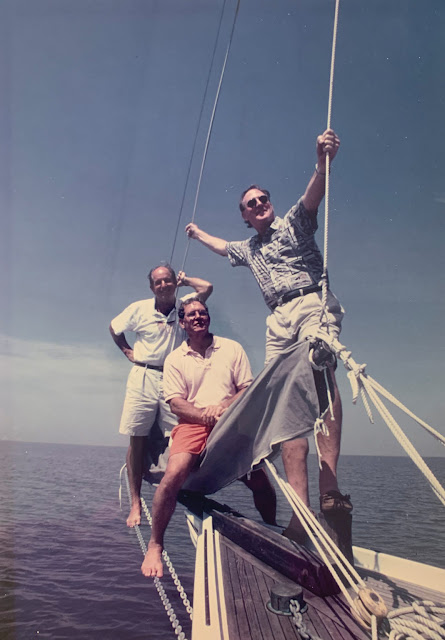'Forrest Gump' Was Patterned on a Boyhood Friendship
Many reviewers of the novel Forrest Gump appreciated author Winston Groom’s handling of Forrest’s voice, a juicy Southern vernacular with a casual disregard for grammar and spelling. According to Groom, Forrest’s voice just came naturally from the people he grew up with. “You hang around shrimpers or duck hunters on the Alabama waterfront, and you’ll hear that voice. They don’t ‘throw’ the ball, they ‘tho’ it.”
When the filming of Forrest Gump brought Groom into the limelight, he admitted that he had based some of Forrest’s vocal patterns and mannerisms on his boyhood pals Jimbo Meador and George Radcliff, to whom he had dedicated the novel. “There’s more than just a little of Jimbo and George in Forrest Gump,” Groom said affectionately. “These guys are the two biggest idiots I know.” In characteristic fashion, Groom’s friend George Radcliff countered that statement with, “He’s a lying sombitch.”
 |
| From left to right, Jimbo Meador, George Radcliff and Winton Groom enjoying a day on the water |
In Groom’s picaresque novel, Forrest is a much earthier character than he is in the movie, prone to using foul language and getting involved in all sorts of bizarre situations. He’s also an accidental philosopher, reflecting our culture through his own unique lens. Toward the end of his adventures, he becomes a shrimp farmer, not a shrimp fisherman.
“One of my best friends is a guy named Jimbo Meador,” said Groom. “He’s an old friend from Mobile, Alabama. For 20 years he worked as the general manager of Bon Secour Fisheries in Alabama. Although he never did any shrimp farming, he was always interested in it, and we used to talk about it a lot. Jimbo knows everything there is to know about shrimp. We used to have lunch about once a week, and it occurred to me after one of these conversations while I was writing Forrest, ‘What better thing to do than make Forrest a shrimp farmer?’”
Jimbo Meador recalled, “When they were getting ready to make the movie, all of a sudden the media started sending people down to interview Winston. Then they started asking about me because of the dedication, and found out that I used to shrimp and used to be an obsessive runner. Suddenly, a lot of the media wanted to make me out to be the ‘real’ Forrest Gump.” According to some of Jimbo Meador’s friends, one big city journalist asked him point blank if it were true that he was the real-life inspiration for Forrest Gump. “I guess,” Jimbo replied, then added after a pause, “all but the idiot part.”
“Winston was encouraging me to talk to these people, but it really got out of hand,” Meador recalled. “People magazine came down here, and a television program called A Current Affair. The London Times sent a reporter, different magazines and newspapers, even a radio station in Australia. Finally, the people at David Letterman called to talk to me about being on the show, but there I drew the line. I kept telling everybody, ‘The story is fiction.’”
“It was an honor that Winston had dedicated the book to me,” Meador said, “but I hope people don’t think I’m an idiot. If they do, it’s maybe because I talk real slow. That’s how we talk down here in the South.”
Charles Gaines, another of Jimbo Meador’s friends, wrote that what makes the concept of Meador as an idiot particularly funny to his many friends “is that no one we know has led a less idiotic life than Jimbo. A man about whom it is impossible to find anyone to say anything even slightly disparaging, he owns a Sufi elder’s fortune of kind and generous imperturbability, amassed over a lifetime of following his bliss as implacably and enthusiastically as a beagle on a rabbit scent. Jimbo’s bliss has been his freedom, and that freedom has always been found on the water and in boats.”
Nonetheless, Jimbo Meador believes there are many admirable qualities in the character he helped inspire. As the bayou philosopher put it recently, “There are things I liked about Forrest. He was a good person, kind of naïve, but a good person who went with the flow. Today, everyone is more concerned about the dollar than doing the right thing. They don’t think about everyone that’s living, everything that’s existing.”
William Grimes, “Following the Star of a Winsome Idiot,” New York Times, 9/1/94
Joseph Olshan and Cindy Dampier, “Surprise Package,” People, 9/5/94
Screen International, 10/11/94
“Shrimp Bites Hollywood,” Shrimp News International, www.shrimpnews.com
Jimbo Meador, “Conversation With Fisherman-Philosopher Jimbo Meador,” Waterkeeper, Spring 2007
Charles Gaines, “Biloxi Reds,” Garden & Gun, 9/25/07


Comments